【新课标】Unit1 how can we become good learers Section B (2a-2e) 表格式教案
文档属性
| 名称 | 【新课标】Unit1 how can we become good learers Section B (2a-2e) 表格式教案 | 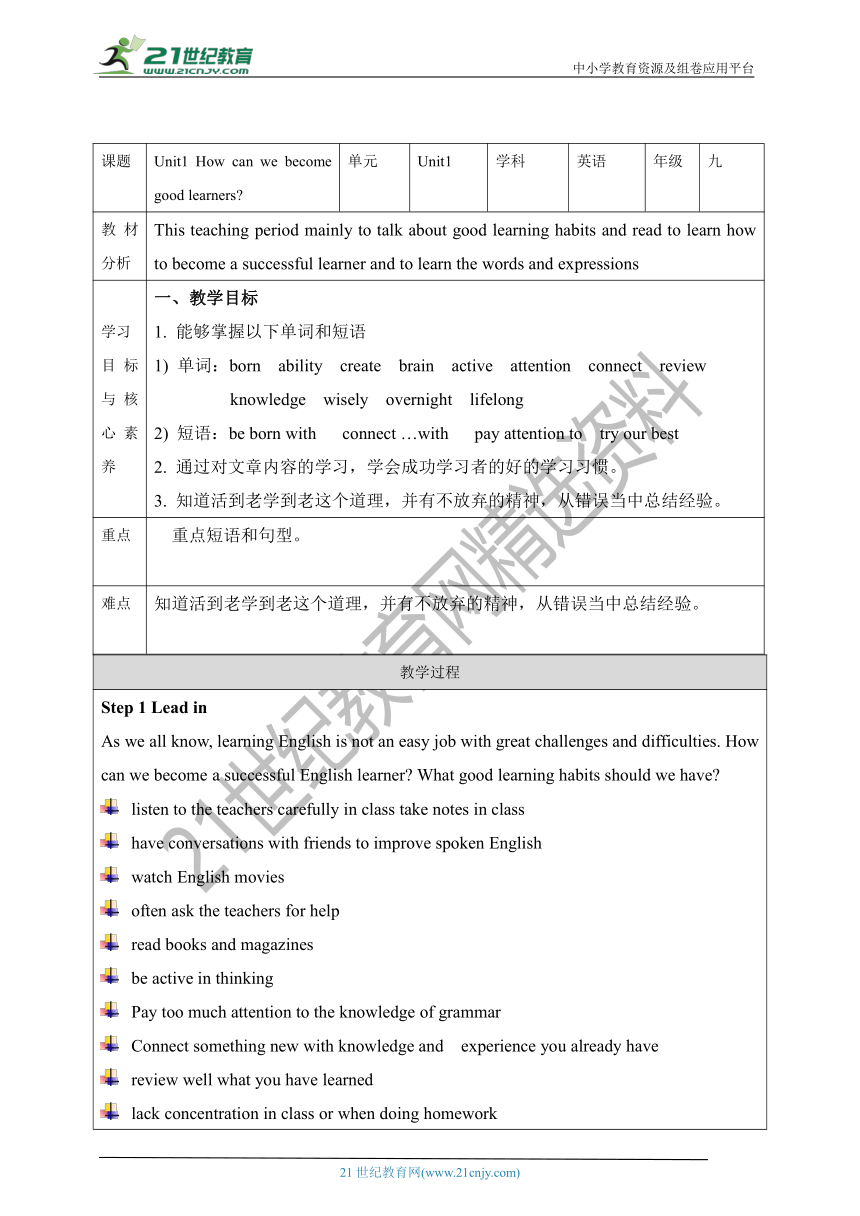 | |
| 格式 | zip | ||
| 文件大小 | 2.1MB | ||
| 资源类型 | 试卷 | ||
| 版本资源 | 人教新目标(Go for it)版 | ||
| 科目 | 英语 | ||
| 更新时间 | 2022-08-12 17:51:47 | ||
图片预览

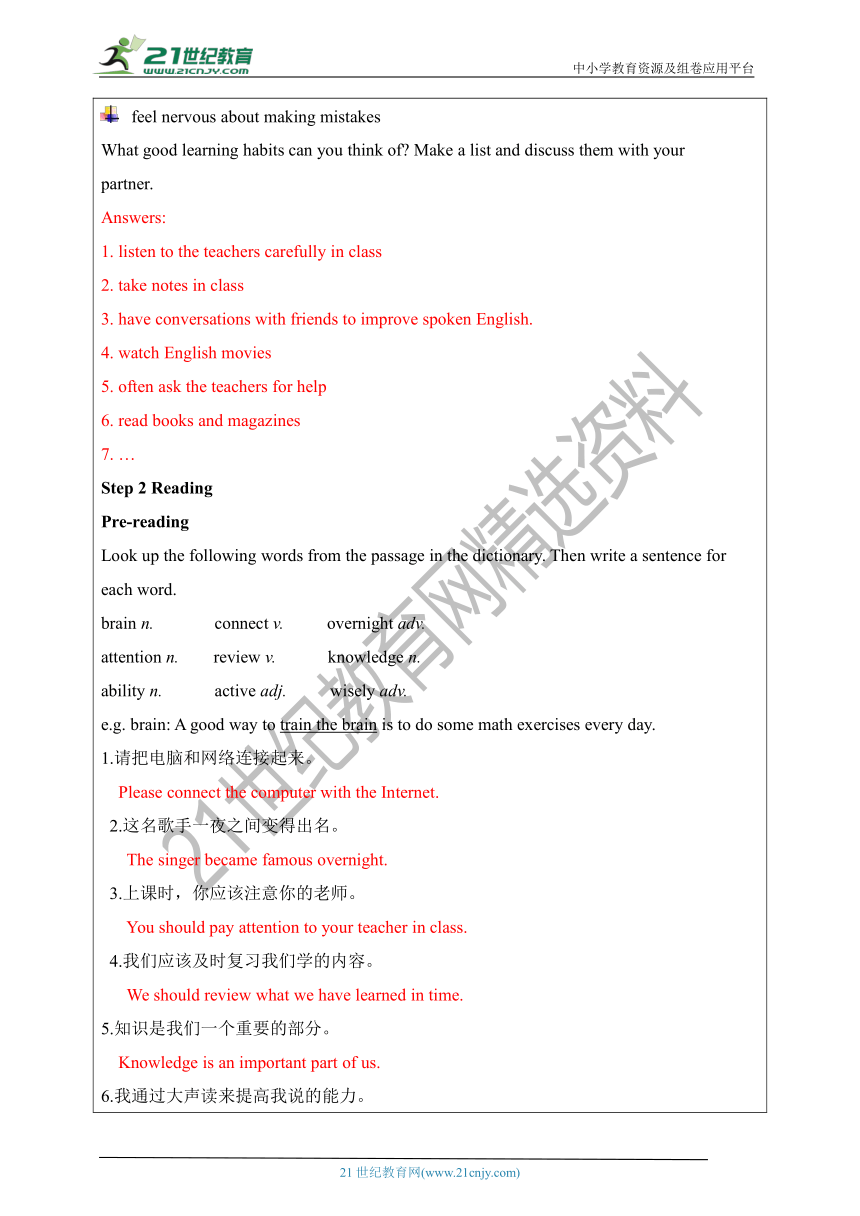
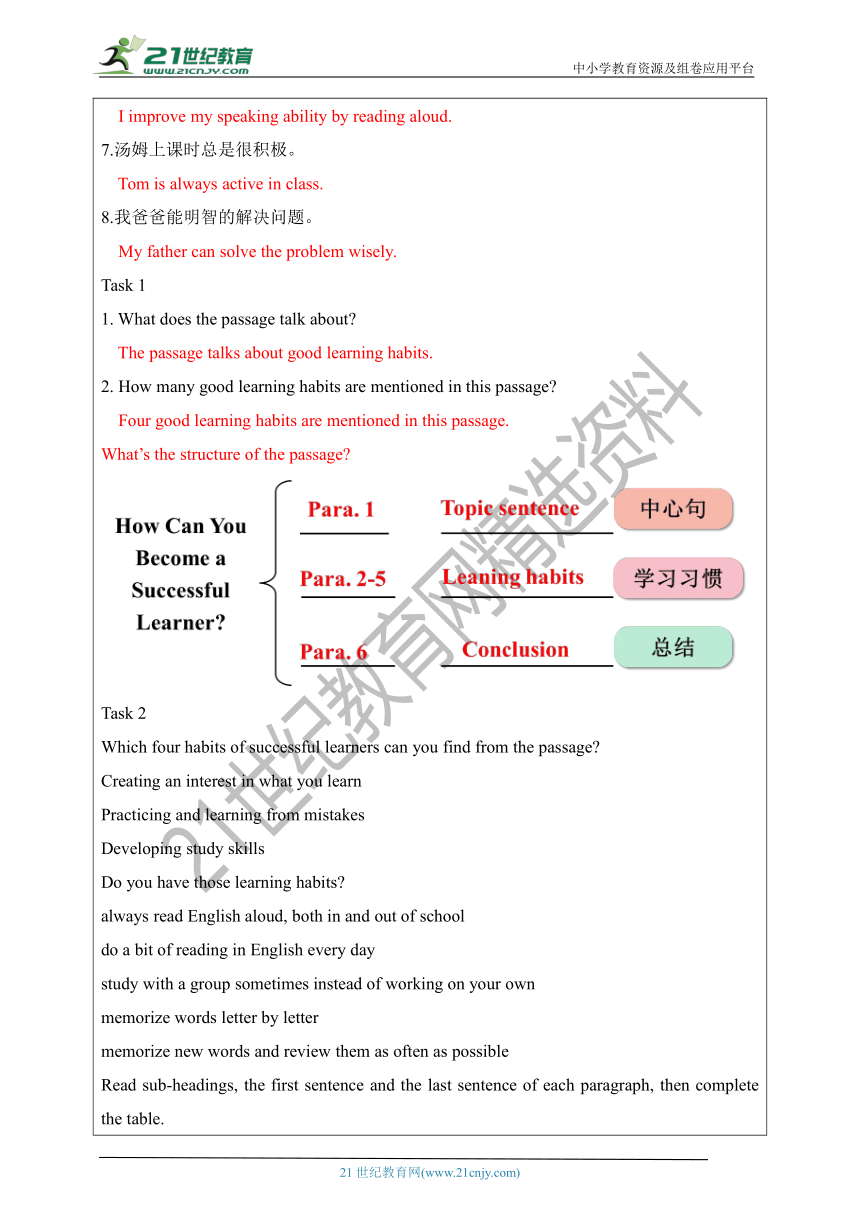
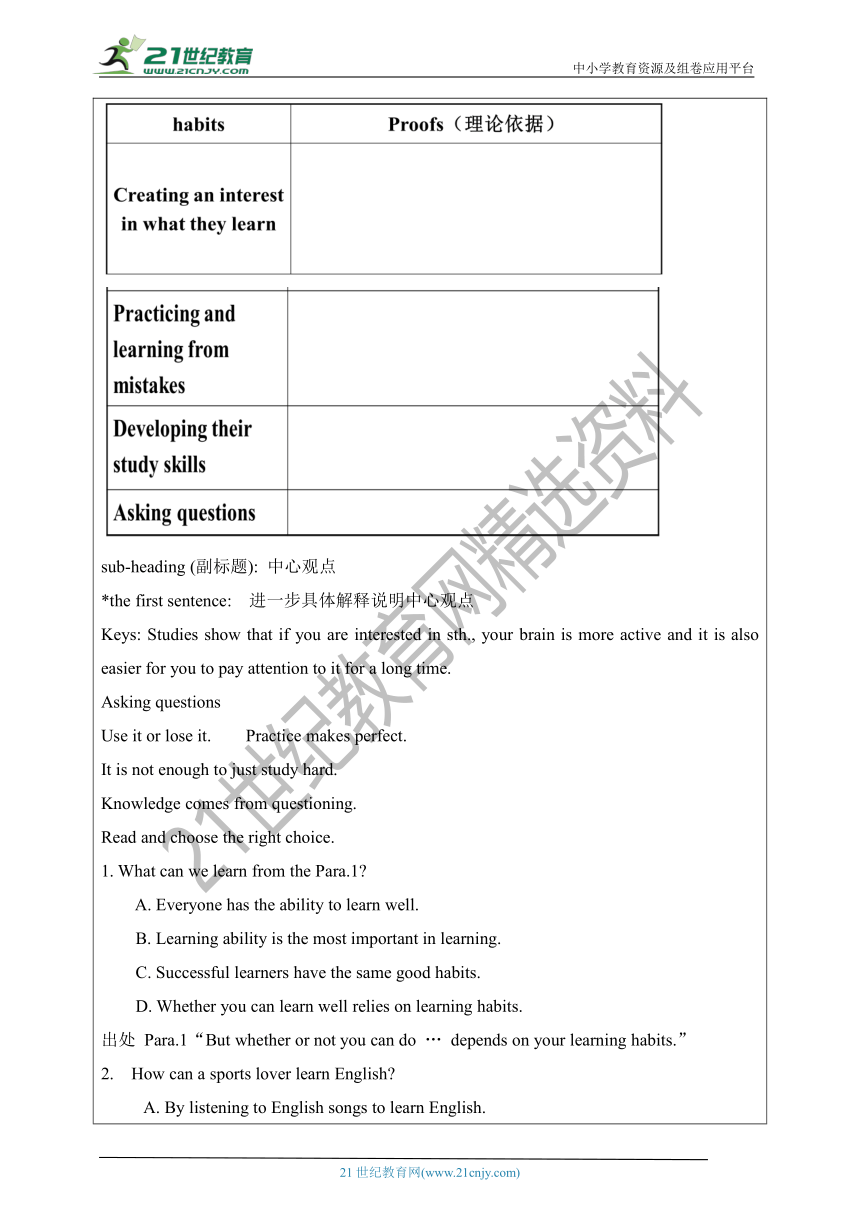
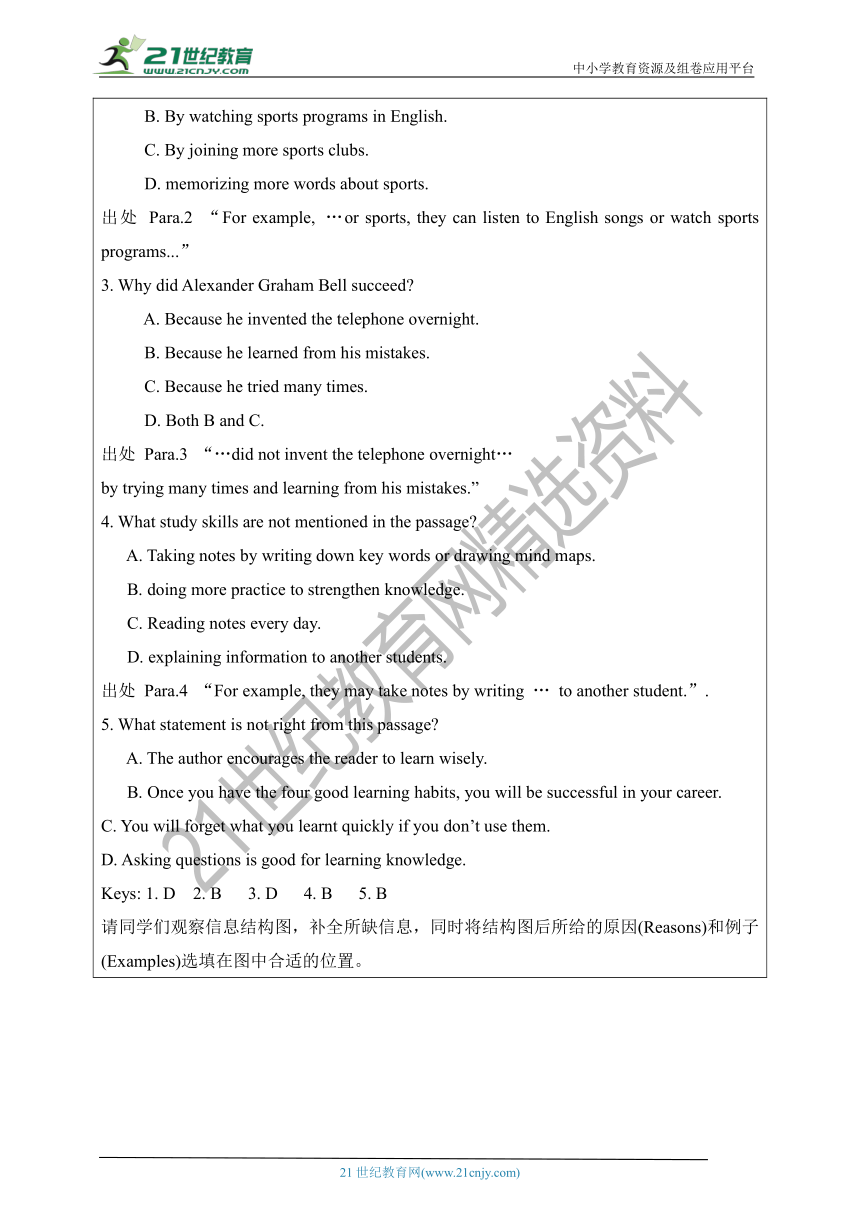
文档简介
中小学教育资源及组卷应用平台
课题 Unit1 How can we become good learners 单元 Unit1 学科 英语 年级 九
教材分析 This teaching period mainly to talk about good learning habits and read to learn how to become a successful learner and to learn the words and expressions
学习目标与核心素养 一、教学目标1. 能够掌握以下单词和短语1) 单词:born ability create brain active attention connect review knowledge wisely overnight lifelong 短语:be born with connect …with pay attention to try our best2. 通过对文章内容的学习,学会成功学习者的好的学习习惯。3. 知道活到老学到老这个道理,并有不放弃的精神,从错误当中总结经验。
重点 重点短语和句型。
难点 知道活到老学到老这个道理,并有不放弃的精神,从错误当中总结经验。
教学过程
1. listen to the teachers carefully in class
2. take notes in class
3. have conversations with friends to improve spoken English.
4. watch English movies
5. often ask the teachers for help
6. read books and magazines
7. …Step 2 Reading Pre-readingLook up the following words from the passage in the dictionary. Then write a sentence for each word.brain n. connect v. overnight adv.attention n. review v. knowledge n.ability n. active adj. wisely adv.e.g. brain: A good way to train the brain is to do some math exercises every day.1.请把电脑和网络连接起来。 Please connect the computer with the Internet. 2.这名歌手一夜之间变得出名。 The singer became famous overnight. 3.上课时,你应该注意你的老师。 You should pay attention to your teacher in class. 4.我们应该及时复习我们学的内容。 We should review what we have learned in time.5.知识是我们一个重要的部分。 Knowledge is an important part of us.6.我通过大声读来提高我说的能力。 I improve my speaking ability by reading aloud.7.汤姆上课时总是很积极。 Tom is always active in class.8.我爸爸能明智的解决问题。 My father can solve the problem wisely.Task 11. What does the passage talk about The passage talks about good learning habits.2. How many good learning habits are mentioned in this passage Four good learning habits are mentioned in this passage.What’s the structure of the passage Task 2Which four habits of successful learners can you find from the passage Creating an interest in what you learnPracticing and learning from mistakesDeveloping study skillsDo you have those learning habits always read English aloud, both in and out of schooldo a bit of reading in English every daystudy with a group sometimes instead of working on your own memorize words letter by lettermemorize new words and review them as often as possibleRead sub-headings, the first sentence and the last sentence of each paragraph, then complete the table.sub-heading (副标题): 中心观点*the first sentence: 进一步具体解释说明中心观点Keys: Studies show that if you are interested in sth., your brain is more active and it is also easier for you to pay attention to it for a long time.Asking questionsUse it or lose it. Practice makes perfect.It is not enough to just study hard.Knowledge comes from questioning.Read and choose the right choice.1. What can we learn from the Para.1 A. Everyone has the ability to learn well. B. Learning ability is the most important in learning. C. Successful learners have the same good habits. D. Whether you can learn well relies on learning habits.出处 Para.1“But whether or not you can do … depends on your learning habits.”2. How can a sports lover learn English A. By listening to English songs to learn English. B. By watching sports programs in English. C. By joining more sports clubs. D. memorizing more words about sports.出处 Para.2 “For example, …or sports, they can listen to English songs or watch sports programs...”3. Why did Alexander Graham Bell succeed A. Because he invented the telephone overnight. B. Because he learned from his mistakes. C. Because he tried many times. D. Both B and C.出处 Para.3 “…did not invent the telephone overnight…by trying many times and learning from his mistakes.”4. What study skills are not mentioned in the passage A. Taking notes by writing down key words or drawing mind maps. B. doing more practice to strengthen knowledge. C. Reading notes every day. D. explaining information to another students.出处 Para.4 “For example, they may take notes by writing … to another student.”.5. What statement is not right from this passage A. The author encourages the reader to learn wisely. B. Once you have the four good learning habits, you will be successful in your career. C. You will forget what you learnt quickly if you don’t use them. D. Asking questions is good for learning knowledge.Keys: 1. D 2. B 3. D 4. B 5. B请同学们观察信息结构图,补全所缺信息,同时将结构图后所给的原因(Reasons)和例子(Examples)选填在图中合适的位置。Reasons:A. It is not enough to just study hard.B. If you learn something, you must use it and practice it, or you’ll forget it. You may not learn it well overnight, and success comes after many failures.C. Knowledge comes from questioning.Examples:D. Good learners take notes by writing down key words or by drawing mind maps and review what they have learned by reading their notes or by explaining the information to others.E. Alexander Graham Bell succeeded in inventing the telephone by trying many times and learning from his mistakes.Keys: 1. Four good learning habits 2-6 BEADC2. 2c Read the passage again and answer the questions. 1. Does the writer think that everyone is born with the ability to learn well Do you agree Why or why not 2. Why is it a good idea to connect something you need to learn with something you are interested in 3. What do the sayings "use it or lose it" and "practice makes perfect" mean Do you agree with them 4. Do good learners learn from mistakes or are they afraid of making mistakes 5. What study skills does the writer talk about Do you have those study skills 6. Do you agree that learning is a lifelong journey Why or why not Answers: 1. The writer doesn’t think that everyone is born with the ability to learn well. I agree with the writer that everyone is born with the ability to learn, but learning well depends on the learning habits that one develops.2. This is because studies show that if you are interested in something. Your brain is more active and it is easier for you to pay attention to it for a long time. You will also not get bored.3. Use it or lose it: If you stop doing something, you will forget how to do it.Practice makes perfect: If you do something again and again, you will become very good at it.4. They learn from mistakes, and they are not afraid of making mistakes.5. Take notes by writing down key words or by drawing mind maps.Look for ways to review what has been learnt, e.g. read the notes every day or explain the information to another student.6. Yes. Learning is a lifelong journey because every day brings something new. Step 4 Groupwork2e Do you think you are a good learner What learning habits do you think are useful Discuss with your group and share your ideas with the class. A: I think another way to become a successful learner is by trying to think about the same thing in different ways.B: I agree. I believe that…Step 5 Language points 1. But whether or not you can do this well depends on your learning habits. 但是能否做好这件事取决于你的学习习惯。1) whether or not you can do it well是从句,作句子的主语。即主语从句。e.g. Whether you did it right or wrong isn’t so important. 你做得对不对并不重要。 What’s important is the experience you gained. 重要的是你从中获得了经验。2) whether or not是从句的一个连词结构,意思和功能相当于whether, “是否”,常出现在宾语从句,主语从句中。也可把whether和or not分开,or not放到句尾。 e.g. I can’t tell whether or not the teacher likes me. = I can’t tell whether the teacher likes me or not.我不知道老师是否喜欢我。3) 3) depend on/ upon 依据;依赖depend on sb. to do sth. 依靠某人做某事e.g. We depend entirely on donations from the public. 我们完全依赖公众的捐助。 I’m depending on you to get this done. 我指望着你把这件事给办了。4) depend on / upon后也可接从句。 e.g. Where to hold the party depends on how many people can come. 派对在哪里举行取决于能有多少人来。【注意】depend on / upon本身含有“被动”的意味,所以不用于被动语态。e.g. Does the quality of teaching depend on class size 教学质量取决于班级的人数吗 拓展【语境应用】写出下列句子中depend on的汉语意思。1) The result depends on how you do it. __________2) She is an honest (诚实的) woman. You can depend on her. ____________Keys: 1) 取决于 2) 信赖2. Research shows that successful learners have some good habits in common. 研究表明,成功的学习者有着某些共同的良好的学习习惯。have sth. in common (with sb./ sth.) 有……共同之处; 有……相同特征e.g. Their methods have a lot in common. 他们的方法有很多相同之处。 They have much in common with their neighbours just across the border. 他们与边境那边相邻而居的人们有许多共同点。拓展have something in common 有一些共同之处have nothing in common 毫无共同之处have a lot in common 有许多共同之处【语境运用】那对双胞胎姐妹毫无共同之处。The twin sisters _____________________.Key: have nothing in common3. Studies show that if you are interested in something, your brain is more active and it is also easier for you to pay attention to it for a long time. 研究表明,如果你对某件事情感兴趣,你的大脑便会更加活跃,同时你也更容易长时间地关注它。 1) be interested in sth. / doing sth. 对……很感兴趣 (1) -ed:修饰人,描述人的声音、表情或感受(2) -ing:修饰事物,描述事物的状态或性质 2) active adj.,积极的;活跃的 e.g. He is an active boy. 他是一个活跃的男孩。 Lisa always takes an active part in all kinds of outdoor activities. Lisa总是积极参加各种户外活动。【词汇联想】派生词:actively adv.积极地;活跃地【语境应用】单项选择。My deskmate is really ________. She likes to attend different activities after school.A. active B. quiet
C. lazy D. honestKey: A3) It is adj. for sb. to do sth. 若形容词表示事物特征的,如: easy, difficult, hard, important等,须用介词for。 It’s +adj. (kind, honest, friendly) + (of sb.) to do sth. 若形容词表示人的性格、品质与特点,如:good, kind, nice, wrong等,用介词of。 e.g. It’s very kind of you to help me with my English. 谢谢你教我英语。【语境应用】单项选择。It’s very convenient ______ us to buy train tickets now because we can buy them either from the station or on the Internet. A. to B. of C. by D. forKey: D4) pay attention to 关注;注意其中to是介词,所以这个短语后的宾语可以是名词 (短语)、代词或动词-ing形式。 e.g. Please pay attention to the difference between the two words. 请注意这两个词之间的区别。【链接】现在我们把初中阶段以介词to结尾的短语归纳如下:add ... to ... → 把……加到……上 according to → 根据 belong to → 属于 be / get used to → 习惯于get back to → 过一会再与某人通话(尤用于打电话)
get to → 到达hold on to → 继续;坚持;保持look forward to → 盼望;期待next to → 紧靠……的旁边;贴近;最接近thanks to → 多亏;幸亏turn to → 转向;翻到【语境应用】找出下面句子中的错误并改正。You should pay attention to do more sports.A B C______________________Key: C; do →doing4. Good learners often connect what they need to learn with something interesting. 好的学习者经常把他们需要学习的东西和有趣的东西联系起来。 connect v. 连接;把……联系起来e.g. Please help me connect the printer with the computer. 请帮我把打印机和电脑连接起来。 We often connect war with death.我们经常会把战争和死亡联系起来。辨析 connect A with B和 connect A to B【语境应用】将下列汉语句子翻译成英语。1) 请把电脑连上网。 ________________________________________________2) 这条路将我们村和那个小镇连接起来了。 ___________________________________________ Keys: 1) Please connect the computer to the Internet. 2) This road connects our village with that small town.5. Good learners think about what they are good at and what they need to practice more. 好的学习者 (会学习的人)思考他们擅长什么和他们需要更多练习的地方。 think about 思考;思索。其后可接名词(短语)、代词或动词-ing形式。 【think短语】think about 想起,考虑think of 想到,认为think over 仔细考虑think out 考虑好think up 想出来think through 认真地考虑practise v. 练习practise doing sth. 练习做某事e.g. Mary is practicing the piano now. 玛丽现在正在练钢琴。 They’re practicing singing the new song. 他们在练习唱新歌。【注意】英式:practise,美式:practice practice n. 练习;实践,不可数名词。 e.g. It’s time to have some good writing practice. 是时候好好练习写作了。【语境应用】完成句子。 Amy practices _______ (play) the piano for over two hours every day.Key: playing6. Even if you learn something well, you will forget it unless you use it. 即使你把某个东西学得很好,如果你不使用它,你也会忘记的。 even if: 即使;虽然,引导让步状语从句,等同于even though /although /though,可置于句首或主句后,不能与but连用。e.g. Even if it’s hard work, I enjoy it. =Even though/Although/Though it’s hard work, I enjoy it. 尽管这是困难的工作,然而我很喜欢。 He will come on time even if it rains. 即使下雨,他也会准时来的。unless 除非; 如果不, 引导条件状语从句; unless=if note.g. You will fail the exam unless you study hard.= You will fail the exam if you don’t study hard. 如果你不努力学习,你考试会不及格的。 Don’t ask me to explain unless you really don’t understand. 不要让我解释,除非你真的不懂。【注意】 在unless和if 引导的条件状语从句中常用一般现在时表示将来。【语境运用】单项选择。 The environment will be much worse _____ everyone has a sense of protecting it. (2019 青海)A. unless B. if C. so that句意:除非每个人都有环保意识,否则环境将变得更糟。Key: A7. They even ask each other and try to find out the answers. 他们甚至互相提问,试图找出答案。辨析:find/look for/find out【语境应用】用find/look for/find out填空。1) They were __________ their teacher everywhere, at last they _______ him at the library.2) Please ________ when the train starts.Keys: 1) looking for; found 2) find out8. Knowledge comes from questioning. 知识来源于不断质疑。 question v. 质疑 e.g. I just accepted what he told me. I never thought to question it. 我刚接受了他告诉我的事情。我从来没有想要质疑。辨析:Problem, question【语境应用】根据句意用problem或question的适当形式填空。1) I’m having some __________ with my classmates. They’re not friendly to me.2) Why don’t you answer my __________ 3) The only ________ is that we don’t have enough money.4) Miss Fan asked me a ________, but I don’t know how to answer it.Keys: 1) problems 2) question(s) 3) problem 4) question9. Everything that you learn becomes a part of you and changes you, so learn wisely and learn well. 你所学的一切都会成为你的一部分并且 改变你,所以明智地学,好好地学吧。 wisely adv. 明智地;聪明地,是由wise加副词后缀-ly构成的。 e.g. The man gave up his choice wisely. 那个男人明智地放弃了他的选择。拓展Step 6 ExerciseⅠ. 从方框中选择合适的单词填空,使每个句子在结构、句意和逻辑上正确。create, review, active, wise1.We only have 100 yuan this week and we should use it _______.2. Linda _______ what she has learned every day so that she can remember it well.3. Although my grandfather is old, he has a(n) _______ brain.4. Soft music _______ a relaxing environment. I like listening to it very much.Ⅱ. 根据句意及所给汉语提示,写出所缺内容,每空一词。1. My father _______ _______ _______(天生具有) the ability to cook well.2. Whether or not we go camping _______ _______(取决于) the weather.3. I’m sorry I wasn’t _______ _______ _______(注意) what you were saying.4. I think we can _______ _______(从……中学习) watching others.9. The book is about how to _______ _______ _______(培养学习技能).10. Children _______ _______ _______ _______(爱上) playing computer games easily.Ⅲ. 根据汉语意思,完成英语句子,每空一词。1. 刚才似乎每个人都害怕面对他。Just now everyone seemed to _______ _______ _______ _______ him.2. 一条新路将我们村与他们村连接了起来。A new road _______ our village _______ theirs. 3. 我认为这两位作家的文章有一些共同之处。I think the two writers’ articles _______ _______ _______ _______.4. 你应该大量练习,熟能生巧。You should practice a lot. _______ _______ _______.5. 如果你想完成这项工作,仅仅使用网络是不够的。If you want to finish the work, _______ _______ _______ _______ _______ just use the Internet.答案Ⅰ. 1. wisely 2. reviews 3. active 4. createsⅡ. 1. was born with 2. depends on 3. paying attention to 4. learn from Ⅲ. 1. be afraid of facing / be afraid to face 2. connects; with 3. have something in common 4. Practice makes perfect 5. it is not enough to Step 6 HomeworkDo you think you are a good learner What learning habits do you think are useful Discuss with your group and share your ideas with the class.A: I think another way to become a successful learner is by trying to think about the same thing in different ways.B: I agree. I believe that…
板书 be born with connect …with pay attention to try our best
人教版英语九年级全册第5课时教学设计
21世纪教育网 www.21cnjy.com 精品试卷·第 2 页 (共 2 页)
HYPERLINK "http://www.21cnjy.com/" 21世纪教育网(www.21cnjy.com)
课题 Unit1 How can we become good learners 单元 Unit1 学科 英语 年级 九
教材分析 This teaching period mainly to talk about good learning habits and read to learn how to become a successful learner and to learn the words and expressions
学习目标与核心素养 一、教学目标1. 能够掌握以下单词和短语1) 单词:born ability create brain active attention connect review knowledge wisely overnight lifelong 短语:be born with connect …with pay attention to try our best2. 通过对文章内容的学习,学会成功学习者的好的学习习惯。3. 知道活到老学到老这个道理,并有不放弃的精神,从错误当中总结经验。
重点 重点短语和句型。
难点 知道活到老学到老这个道理,并有不放弃的精神,从错误当中总结经验。
教学过程
1. listen to the teachers carefully in class
2. take notes in class
3. have conversations with friends to improve spoken English.
4. watch English movies
5. often ask the teachers for help
6. read books and magazines
7. …Step 2 Reading Pre-readingLook up the following words from the passage in the dictionary. Then write a sentence for each word.brain n. connect v. overnight adv.attention n. review v. knowledge n.ability n. active adj. wisely adv.e.g. brain: A good way to train the brain is to do some math exercises every day.1.请把电脑和网络连接起来。 Please connect the computer with the Internet. 2.这名歌手一夜之间变得出名。 The singer became famous overnight. 3.上课时,你应该注意你的老师。 You should pay attention to your teacher in class. 4.我们应该及时复习我们学的内容。 We should review what we have learned in time.5.知识是我们一个重要的部分。 Knowledge is an important part of us.6.我通过大声读来提高我说的能力。 I improve my speaking ability by reading aloud.7.汤姆上课时总是很积极。 Tom is always active in class.8.我爸爸能明智的解决问题。 My father can solve the problem wisely.Task 11. What does the passage talk about The passage talks about good learning habits.2. How many good learning habits are mentioned in this passage Four good learning habits are mentioned in this passage.What’s the structure of the passage Task 2Which four habits of successful learners can you find from the passage Creating an interest in what you learnPracticing and learning from mistakesDeveloping study skillsDo you have those learning habits always read English aloud, both in and out of schooldo a bit of reading in English every daystudy with a group sometimes instead of working on your own memorize words letter by lettermemorize new words and review them as often as possibleRead sub-headings, the first sentence and the last sentence of each paragraph, then complete the table.sub-heading (副标题): 中心观点*the first sentence: 进一步具体解释说明中心观点Keys: Studies show that if you are interested in sth., your brain is more active and it is also easier for you to pay attention to it for a long time.Asking questionsUse it or lose it. Practice makes perfect.It is not enough to just study hard.Knowledge comes from questioning.Read and choose the right choice.1. What can we learn from the Para.1 A. Everyone has the ability to learn well. B. Learning ability is the most important in learning. C. Successful learners have the same good habits. D. Whether you can learn well relies on learning habits.出处 Para.1“But whether or not you can do … depends on your learning habits.”2. How can a sports lover learn English A. By listening to English songs to learn English. B. By watching sports programs in English. C. By joining more sports clubs. D. memorizing more words about sports.出处 Para.2 “For example, …or sports, they can listen to English songs or watch sports programs...”3. Why did Alexander Graham Bell succeed A. Because he invented the telephone overnight. B. Because he learned from his mistakes. C. Because he tried many times. D. Both B and C.出处 Para.3 “…did not invent the telephone overnight…by trying many times and learning from his mistakes.”4. What study skills are not mentioned in the passage A. Taking notes by writing down key words or drawing mind maps. B. doing more practice to strengthen knowledge. C. Reading notes every day. D. explaining information to another students.出处 Para.4 “For example, they may take notes by writing … to another student.”.5. What statement is not right from this passage A. The author encourages the reader to learn wisely. B. Once you have the four good learning habits, you will be successful in your career. C. You will forget what you learnt quickly if you don’t use them. D. Asking questions is good for learning knowledge.Keys: 1. D 2. B 3. D 4. B 5. B请同学们观察信息结构图,补全所缺信息,同时将结构图后所给的原因(Reasons)和例子(Examples)选填在图中合适的位置。Reasons:A. It is not enough to just study hard.B. If you learn something, you must use it and practice it, or you’ll forget it. You may not learn it well overnight, and success comes after many failures.C. Knowledge comes from questioning.Examples:D. Good learners take notes by writing down key words or by drawing mind maps and review what they have learned by reading their notes or by explaining the information to others.E. Alexander Graham Bell succeeded in inventing the telephone by trying many times and learning from his mistakes.Keys: 1. Four good learning habits 2-6 BEADC2. 2c Read the passage again and answer the questions. 1. Does the writer think that everyone is born with the ability to learn well Do you agree Why or why not 2. Why is it a good idea to connect something you need to learn with something you are interested in 3. What do the sayings "use it or lose it" and "practice makes perfect" mean Do you agree with them 4. Do good learners learn from mistakes or are they afraid of making mistakes 5. What study skills does the writer talk about Do you have those study skills 6. Do you agree that learning is a lifelong journey Why or why not Answers: 1. The writer doesn’t think that everyone is born with the ability to learn well. I agree with the writer that everyone is born with the ability to learn, but learning well depends on the learning habits that one develops.2. This is because studies show that if you are interested in something. Your brain is more active and it is easier for you to pay attention to it for a long time. You will also not get bored.3. Use it or lose it: If you stop doing something, you will forget how to do it.Practice makes perfect: If you do something again and again, you will become very good at it.4. They learn from mistakes, and they are not afraid of making mistakes.5. Take notes by writing down key words or by drawing mind maps.Look for ways to review what has been learnt, e.g. read the notes every day or explain the information to another student.6. Yes. Learning is a lifelong journey because every day brings something new. Step 4 Groupwork2e Do you think you are a good learner What learning habits do you think are useful Discuss with your group and share your ideas with the class. A: I think another way to become a successful learner is by trying to think about the same thing in different ways.B: I agree. I believe that…Step 5 Language points 1. But whether or not you can do this well depends on your learning habits. 但是能否做好这件事取决于你的学习习惯。1) whether or not you can do it well是从句,作句子的主语。即主语从句。e.g. Whether you did it right or wrong isn’t so important. 你做得对不对并不重要。 What’s important is the experience you gained. 重要的是你从中获得了经验。2) whether or not是从句的一个连词结构,意思和功能相当于whether, “是否”,常出现在宾语从句,主语从句中。也可把whether和or not分开,or not放到句尾。 e.g. I can’t tell whether or not the teacher likes me. = I can’t tell whether the teacher likes me or not.我不知道老师是否喜欢我。3) 3) depend on/ upon 依据;依赖depend on sb. to do sth. 依靠某人做某事e.g. We depend entirely on donations from the public. 我们完全依赖公众的捐助。 I’m depending on you to get this done. 我指望着你把这件事给办了。4) depend on / upon后也可接从句。 e.g. Where to hold the party depends on how many people can come. 派对在哪里举行取决于能有多少人来。【注意】depend on / upon本身含有“被动”的意味,所以不用于被动语态。e.g. Does the quality of teaching depend on class size 教学质量取决于班级的人数吗 拓展【语境应用】写出下列句子中depend on的汉语意思。1) The result depends on how you do it. __________2) She is an honest (诚实的) woman. You can depend on her. ____________Keys: 1) 取决于 2) 信赖2. Research shows that successful learners have some good habits in common. 研究表明,成功的学习者有着某些共同的良好的学习习惯。have sth. in common (with sb./ sth.) 有……共同之处; 有……相同特征e.g. Their methods have a lot in common. 他们的方法有很多相同之处。 They have much in common with their neighbours just across the border. 他们与边境那边相邻而居的人们有许多共同点。拓展have something in common 有一些共同之处have nothing in common 毫无共同之处have a lot in common 有许多共同之处【语境运用】那对双胞胎姐妹毫无共同之处。The twin sisters _____________________.Key: have nothing in common3. Studies show that if you are interested in something, your brain is more active and it is also easier for you to pay attention to it for a long time. 研究表明,如果你对某件事情感兴趣,你的大脑便会更加活跃,同时你也更容易长时间地关注它。 1) be interested in sth. / doing sth. 对……很感兴趣 (1) -ed:修饰人,描述人的声音、表情或感受(2) -ing:修饰事物,描述事物的状态或性质 2) active adj.,积极的;活跃的 e.g. He is an active boy. 他是一个活跃的男孩。 Lisa always takes an active part in all kinds of outdoor activities. Lisa总是积极参加各种户外活动。【词汇联想】派生词:actively adv.积极地;活跃地【语境应用】单项选择。My deskmate is really ________. She likes to attend different activities after school.A. active B. quiet
C. lazy D. honestKey: A3) It is adj. for sb. to do sth. 若形容词表示事物特征的,如: easy, difficult, hard, important等,须用介词for。 It’s +adj. (kind, honest, friendly) + (of sb.) to do sth. 若形容词表示人的性格、品质与特点,如:good, kind, nice, wrong等,用介词of。 e.g. It’s very kind of you to help me with my English. 谢谢你教我英语。【语境应用】单项选择。It’s very convenient ______ us to buy train tickets now because we can buy them either from the station or on the Internet. A. to B. of C. by D. forKey: D4) pay attention to 关注;注意其中to是介词,所以这个短语后的宾语可以是名词 (短语)、代词或动词-ing形式。 e.g. Please pay attention to the difference between the two words. 请注意这两个词之间的区别。【链接】现在我们把初中阶段以介词to结尾的短语归纳如下:add ... to ... → 把……加到……上 according to → 根据 belong to → 属于 be / get used to → 习惯于get back to → 过一会再与某人通话(尤用于打电话)
get to → 到达hold on to → 继续;坚持;保持look forward to → 盼望;期待next to → 紧靠……的旁边;贴近;最接近thanks to → 多亏;幸亏turn to → 转向;翻到【语境应用】找出下面句子中的错误并改正。You should pay attention to do more sports.A B C______________________Key: C; do →doing4. Good learners often connect what they need to learn with something interesting. 好的学习者经常把他们需要学习的东西和有趣的东西联系起来。 connect v. 连接;把……联系起来e.g. Please help me connect the printer with the computer. 请帮我把打印机和电脑连接起来。 We often connect war with death.我们经常会把战争和死亡联系起来。辨析 connect A with B和 connect A to B【语境应用】将下列汉语句子翻译成英语。1) 请把电脑连上网。 ________________________________________________2) 这条路将我们村和那个小镇连接起来了。 ___________________________________________ Keys: 1) Please connect the computer to the Internet. 2) This road connects our village with that small town.5. Good learners think about what they are good at and what they need to practice more. 好的学习者 (会学习的人)思考他们擅长什么和他们需要更多练习的地方。 think about 思考;思索。其后可接名词(短语)、代词或动词-ing形式。 【think短语】think about 想起,考虑think of 想到,认为think over 仔细考虑think out 考虑好think up 想出来think through 认真地考虑practise v. 练习practise doing sth. 练习做某事e.g. Mary is practicing the piano now. 玛丽现在正在练钢琴。 They’re practicing singing the new song. 他们在练习唱新歌。【注意】英式:practise,美式:practice practice n. 练习;实践,不可数名词。 e.g. It’s time to have some good writing practice. 是时候好好练习写作了。【语境应用】完成句子。 Amy practices _______ (play) the piano for over two hours every day.Key: playing6. Even if you learn something well, you will forget it unless you use it. 即使你把某个东西学得很好,如果你不使用它,你也会忘记的。 even if: 即使;虽然,引导让步状语从句,等同于even though /although /though,可置于句首或主句后,不能与but连用。e.g. Even if it’s hard work, I enjoy it. =Even though/Although/Though it’s hard work, I enjoy it. 尽管这是困难的工作,然而我很喜欢。 He will come on time even if it rains. 即使下雨,他也会准时来的。unless 除非; 如果不, 引导条件状语从句; unless=if note.g. You will fail the exam unless you study hard.= You will fail the exam if you don’t study hard. 如果你不努力学习,你考试会不及格的。 Don’t ask me to explain unless you really don’t understand. 不要让我解释,除非你真的不懂。【注意】 在unless和if 引导的条件状语从句中常用一般现在时表示将来。【语境运用】单项选择。 The environment will be much worse _____ everyone has a sense of protecting it. (2019 青海)A. unless B. if C. so that句意:除非每个人都有环保意识,否则环境将变得更糟。Key: A7. They even ask each other and try to find out the answers. 他们甚至互相提问,试图找出答案。辨析:find/look for/find out【语境应用】用find/look for/find out填空。1) They were __________ their teacher everywhere, at last they _______ him at the library.2) Please ________ when the train starts.Keys: 1) looking for; found 2) find out8. Knowledge comes from questioning. 知识来源于不断质疑。 question v. 质疑 e.g. I just accepted what he told me. I never thought to question it. 我刚接受了他告诉我的事情。我从来没有想要质疑。辨析:Problem, question【语境应用】根据句意用problem或question的适当形式填空。1) I’m having some __________ with my classmates. They’re not friendly to me.2) Why don’t you answer my __________ 3) The only ________ is that we don’t have enough money.4) Miss Fan asked me a ________, but I don’t know how to answer it.Keys: 1) problems 2) question(s) 3) problem 4) question9. Everything that you learn becomes a part of you and changes you, so learn wisely and learn well. 你所学的一切都会成为你的一部分并且 改变你,所以明智地学,好好地学吧。 wisely adv. 明智地;聪明地,是由wise加副词后缀-ly构成的。 e.g. The man gave up his choice wisely. 那个男人明智地放弃了他的选择。拓展Step 6 ExerciseⅠ. 从方框中选择合适的单词填空,使每个句子在结构、句意和逻辑上正确。create, review, active, wise1.We only have 100 yuan this week and we should use it _______.2. Linda _______ what she has learned every day so that she can remember it well.3. Although my grandfather is old, he has a(n) _______ brain.4. Soft music _______ a relaxing environment. I like listening to it very much.Ⅱ. 根据句意及所给汉语提示,写出所缺内容,每空一词。1. My father _______ _______ _______(天生具有) the ability to cook well.2. Whether or not we go camping _______ _______(取决于) the weather.3. I’m sorry I wasn’t _______ _______ _______(注意) what you were saying.4. I think we can _______ _______(从……中学习) watching others.9. The book is about how to _______ _______ _______(培养学习技能).10. Children _______ _______ _______ _______(爱上) playing computer games easily.Ⅲ. 根据汉语意思,完成英语句子,每空一词。1. 刚才似乎每个人都害怕面对他。Just now everyone seemed to _______ _______ _______ _______ him.2. 一条新路将我们村与他们村连接了起来。A new road _______ our village _______ theirs. 3. 我认为这两位作家的文章有一些共同之处。I think the two writers’ articles _______ _______ _______ _______.4. 你应该大量练习,熟能生巧。You should practice a lot. _______ _______ _______.5. 如果你想完成这项工作,仅仅使用网络是不够的。If you want to finish the work, _______ _______ _______ _______ _______ just use the Internet.答案Ⅰ. 1. wisely 2. reviews 3. active 4. createsⅡ. 1. was born with 2. depends on 3. paying attention to 4. learn from Ⅲ. 1. be afraid of facing / be afraid to face 2. connects; with 3. have something in common 4. Practice makes perfect 5. it is not enough to Step 6 HomeworkDo you think you are a good learner What learning habits do you think are useful Discuss with your group and share your ideas with the class.A: I think another way to become a successful learner is by trying to think about the same thing in different ways.B: I agree. I believe that…
板书 be born with connect …with pay attention to try our best
人教版英语九年级全册第5课时教学设计
21世纪教育网 www.21cnjy.com 精品试卷·第 2 页 (共 2 页)
HYPERLINK "http://www.21cnjy.com/" 21世纪教育网(www.21cnjy.com)
同课章节目录
- Unit 1 How can we become good learners.
- Section A
- Section B
- Unit 2 I think that mooncakes are delicious!
- Section A
- Section B
- Unit 3 Could you please tell me where the restroom
- Section A
- Section B
- Unit 4 I used to be afraid of the dark.
- Section A
- Section B
- Unit 5 What are the shirts made of?
- Section A
- Section B
- Review of Units 1-5
- Unit 6 When was it invented?
- Section A
- Section B
- Unit 7 Teenagers should be allowed to choose their
- Section A
- Section B
- Unit 8 It must belong to Carla.
- Section A
- Section B
- Unit 9 I like music that I can dance to.
- Section A
- Section B
- Unit 10 You're supposed to shake hands.
- Section A
- Section B
- Review of Units 6-10
- Unit 11 Sad movies make me cry.
- Section A
- Section B
- Unit 12 Life is full of the unexpected
- Section A
- Section B
- Unit 13 We're trying to save the earth!
- Section A
- Section B
- Unit 14 I remember meeting all of you in Grade 7.
- Section A
- Section B
- Review of Units 11-14
